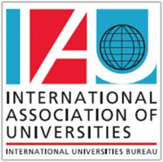|
 |
|
|
 |
|
 |
| |
| |
IFNMU International
Representative Website |
|
|
| |
Find us at |
|
|
| |
|
|
| |
 |
| |
|
| |
|
| |
|
| |
|
| Membership |
| |
IFNMU is a permanent and full member of an International Association of Universities, European University Association, Euroasian Universities Association, Association of Economic Universities of South and Easten Europe and the Black See Region, Association of Slavic Universities, European Educational Society, World Health Organization and others.
IFNMU is an active participant of the Bologna process, it has signed the Magna Charta Universitatum. |
| |
| International Association of Universities |
 |
 International Association of Universities, founded in 1950, is the UNESCO-based worldwide association of higher education institutions. It brings together institutions and organisations from some 150 countries for reflection and action on common concerns and collaborates with various international, regional and national bodies active in higher education. Its services are available on the priority basis to Members but also to organisations, institutions and authorities concerned with higher education, as well as to individual policy and decision-makers, specialists, administrators, teachers, researchers and students. International Association of Universities, founded in 1950, is the UNESCO-based worldwide association of higher education institutions. It brings together institutions and organisations from some 150 countries for reflection and action on common concerns and collaborates with various international, regional and national bodies active in higher education. Its services are available on the priority basis to Members but also to organisations, institutions and authorities concerned with higher education, as well as to individual policy and decision-makers, specialists, administrators, teachers, researchers and students.
The Association aims at giving expression to the obligation of universities and other higher education institutions as social institutions to promote, through teaching, research and services, the principles of freedom and justice, of human dignity and solidarity, and contributes, through international cooperation, to the development of material and moral assistance for the strengthening of higher education generally.
IAU's mission is based on the fundamental principles for which every university should stand: |
 |
| |
 |
The right to pursue knowledge for its own sake and to follow wherever the search for truth may lead; |
 |
 |
 |
| |
 |
The tolerance of divergent opinion and freedom from political interference. |
|
 |
| The overall goals of IAU are both internal and external: |
 |
| |
 |
IAU links up its Members, offering them quality services, networking and collective action. |
 |
 |
 |
| |
 |
The Association speaks on behalf of universities, other higher education institutions and associations and represents their concerns and interests in public debate and to outside partners. |
|
| |
Both of these complementary goals are pursued through future oriented collective action, including conferences and meetings, information services, policy discussion, research and publications.
By encouraging Members to work together, IAU |
 |
| |
 |
Facilitates the exchange of experience and learning and fosters cooperation; |
 |
 |
 |
| |
 |
Restates and defends the academic values and principles that underlie and determine the proper functioning of universities and other higher education institutions; |
 |
 |
 |
| |
 |
Upholds and contributes to the development of a long-term vision of universities’ role and responsibilities in society; |
 |
 |
 |
| |
 |
Voices the concerns for higher education with regard to policies of international bodies such as UNESCO, the World Bank and others; |
 |
 |
 |
| |
 |
Contributes to a better understanding of current trends and policy developments through analysis, research and debate; |
 |
 |
 |
| |
 |
Provides comprehensive and authoritative information on higher education systems, institutions and qualifications worldwide. |
|
| |
| The European University Association |
 |
 The European University Association (EUA) represents and supports more than 850 institutions of higher education in 46 countries, providing them with a forum for cooperation and exchange of information on higher education and research policies. Members of the Association are European universities involved in teaching and research, national associations of rectors and other organisations active in higher education and research. EUA is the result of a merger between the Association of European Universities (CRE) and the Confederation of European Union Rectors' Conferences. The merger took place in Salamanca on 31 March 2001. The European University Association (EUA) represents and supports more than 850 institutions of higher education in 46 countries, providing them with a forum for cooperation and exchange of information on higher education and research policies. Members of the Association are European universities involved in teaching and research, national associations of rectors and other organisations active in higher education and research. EUA is the result of a merger between the Association of European Universities (CRE) and the Confederation of European Union Rectors' Conferences. The merger took place in Salamanca on 31 March 2001. |
| |
| Association of Economic Universities of South and Eastern Europe and the Black Sea Region |
 |
 On November 1996, after the appropriate preparatory work, the Rector of University of Macedonia, Thessaloniki, Greece, Professor Yannis Tsekouras, took the initiative to invite in Thessaloniki Rectors of Economic Universities, Heads of Economic Departments and Deans of Economic Faculties so as to establish the Association of South Eastern Europe Economic Universities (ASECU). The invitation was sent to Universities of Albania, Yugoslavia, Bosnia Herzegovina, Bulgaria, Romania and Greece.
At the beginning 24 Universities of the previously mentioned countries corresponded, and these later composed the founding members of the Association. In the founding meeting the Statute was being approved and also was decided the enlargement of the Association to the Economic Universities of the other South Eastern Europe countries. On November 1996, after the appropriate preparatory work, the Rector of University of Macedonia, Thessaloniki, Greece, Professor Yannis Tsekouras, took the initiative to invite in Thessaloniki Rectors of Economic Universities, Heads of Economic Departments and Deans of Economic Faculties so as to establish the Association of South Eastern Europe Economic Universities (ASECU). The invitation was sent to Universities of Albania, Yugoslavia, Bosnia Herzegovina, Bulgaria, Romania and Greece.
At the beginning 24 Universities of the previously mentioned countries corresponded, and these later composed the founding members of the Association. In the founding meeting the Statute was being approved and also was decided the enlargement of the Association to the Economic Universities of the other South Eastern Europe countries.
By decision taken in General Assembly of 2007, the Association was modified in Association of Economic Universities of South and Eastern Europe and the Black Sea Region. Also it was decided the acceptance as Associated members, Universities from the Middle East and North-Eastern Africa (article 4 §4 of Statute). This decision was taken in response to expressions of interest in joining the Association from economic universities in countries from these regions. Presently, forty five Universities are active members of ASECU. Forty one as regular members from Albania, Armenia, Bosnia-Herzegovina, Bulgaria FYROM, Greece, Montenegro, Poland, Romania, Russia, Serbia, Slovakia, Turkey and Ukraine and four as associated members from Egypt and Lebanon. The seat of the Association is Thessaloniki, where the Secretariat of the Association is also based. The offices of the Board of Governors of the Association are situated at the place where the incumbent president of the Board exercises her/his academic activities. |
| |
| Magna Charta Observatory |
 |
 The Magna Charta Observatory of Fundamental University Values and Rights is a non-profit organisation based in Bologna, founded by the University of Bologna and the European University Association (EUA). The Magna Charta Observatory aims to gather information, express opinions and prepare documents relating to the respect for, and protection of, the fundamental university values and rights laid down in the Magna Charta Universitatum signed in Bologna in 1988 by 388 Rectors of worldwide main universities.
The Observatory may work together or in agreement with other national, European or international organisations pursuing similar or compatible aims. The Magna Charta Observatory of Fundamental University Values and Rights is a non-profit organisation based in Bologna, founded by the University of Bologna and the European University Association (EUA). The Magna Charta Observatory aims to gather information, express opinions and prepare documents relating to the respect for, and protection of, the fundamental university values and rights laid down in the Magna Charta Universitatum signed in Bologna in 1988 by 388 Rectors of worldwide main universities.
The Observatory may work together or in agreement with other national, European or international organisations pursuing similar or compatible aims. |
| |
| World Health Organization |
 |
 World Health Organization (WHO) is the directing and coordinating authority for health within the United Nations system. It is responsible for providing leadership on global health matters, shaping the health research agenda, setting norms and standards, articulating evidence-based policy options, providing technical support to countries and monitoring and assessing health trends. In the 21st century, health is a shared responsibility, involving equitable access to essential care and collective defence against transnational threats. World Health Organization (WHO) is the directing and coordinating authority for health within the United Nations system. It is responsible for providing leadership on global health matters, shaping the health research agenda, setting norms and standards, articulating evidence-based policy options, providing technical support to countries and monitoring and assessing health trends. In the 21st century, health is a shared responsibility, involving equitable access to essential care and collective defence against transnational threats. |
| |
| |
|
|